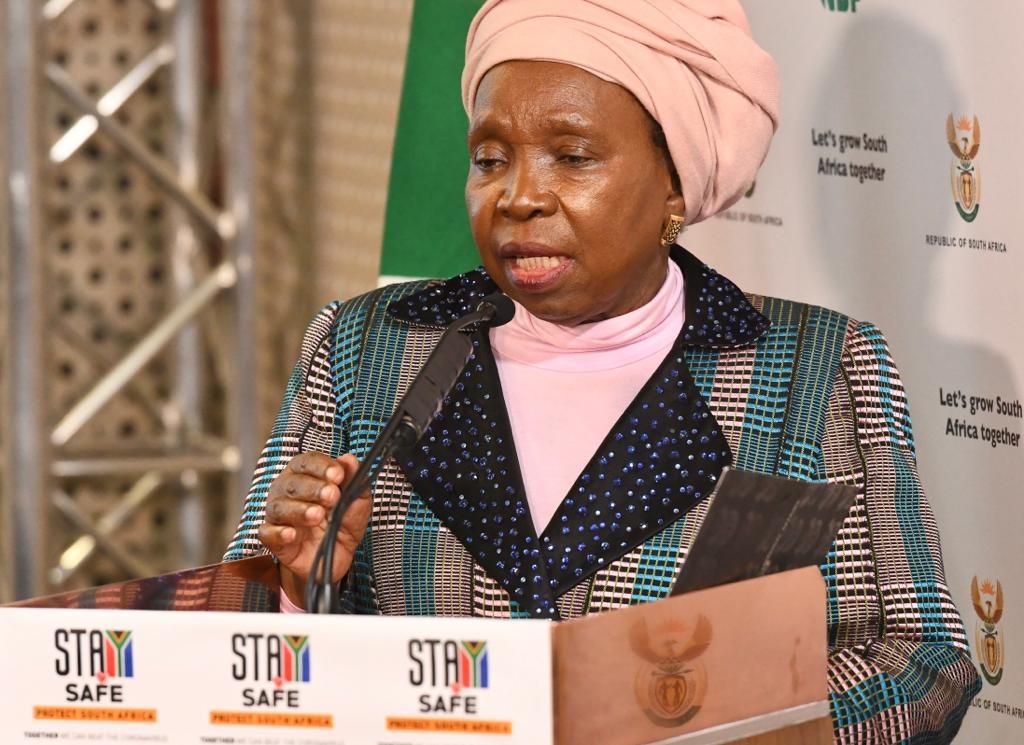


Minister of Cooperative Governance and Traditional Affairs Nkosazana Dlamini-Zuma.
- The Gauteng High Court in Pretoria declared lockdown Levels 4 and 3 regulations unconstitutional and invalid.
- Minister of Cooperative Governance and Traditional Affairs Nkosazana Dlamini-Zuma applied for leave to appeal, saying there was a reasonable prospect of success.
- In court, it was further argued if there wasn’t a prospect of success, the judgment should still be assessed by a higher court as it was an important matter.
The High Court judgment which declared some Level 3 and 4 lockdown regulations invalid, is of profound importance and needs to be assessed by a higher court irrespective of whether it is correct or not.
This was one of the arguments put forward by senior counsel Wim Trengove, acting on behalf of Cooperative Governance and Traditional Affairs Minister Nkosazana Dlamini-Zuma in her leave to appeal application before the Gauteng High Court in Pretoria on Wednesday.
Trengove explained there were compelling reasons for the Supreme Court of Appeal to make a determination on the judgment.
He said whether the judgment was correct or incorrect, it was still of profound importance.
READ HERE | Covid-19: ‘Nothing could have prepared us to deal with this virus’ – Dlamini-Zuma tells NCOP
To this end, Trengove argued that regardless of the prospects of success of the appeal in another court, the case needed to be determined urgently.
The ruling by Judge Norman Davis, handed down at the beginning of June, found most of the regulations did not pass the rationality test, nor were they rationally connected to the objectives of slowing the rate of infection of Covid-19, which is why the regulations were promulgated in the first place.
The court also found that insofar as the lockdown regulations did not satisfy the rationality test, their encroachment on and limitation of the rights guaranteed in the Bill of Rights contained in the Constitution were not justifiable.
READ | Lockdown: ‘We don’t trust the government’ – DA on why it is going ahead with court bids
However, the judgment did not go into detail explaining which regulations were unconstitutional and offered no reasons for such a declaration.
Instead, Davis gave a few examples and then made a wholesale declaration of invalidity save for a few regulations, including prohibitions of evictions, initiation practices and the closure of night clubs, which he said were rationally connected to the stated objectives.
Trengrove spoke to this point, contending that the judgment fell short of informing the minister with sufficient details of which regulations were irrational and why they were invalid.
He further argued that the finding that some regulations are invalid did not justify an order declaring all of them invalid.
Trengrove added there was no basis in law to make such an order and that the minister needed to be informed of the errors in order to make amendments if necessary.
Advocate Reg Willis, for the Liberty Fighters Network (LFN), which brought the urgent application against the regulations, dismissed the minister’s arguments, saying it was not necessary to list each regulation as the bid was a full frontal attack on each and every regulation.
Willis added the regulations were promulgated with a lack of political will to consider the Constitution and that the arguments would not survive on an appeal.
OPINION | Understanding the Disaster Management Act and its implementation
He said no case was ever made out to justify the regulations in the first place.
In terms of the judgment, Willis argued there was no scope for misunderstanding and there were no compelling reasons for a higher court to unravel and consider the judgment.
Despite being represented by Willis, who made submissions to the court, Reyno de Beer of the LFN also made submissions to the court, arguing the application for leave to appeal did not suspend the court’s order.
He further argued the court should forget about the technicalities, saying the interest of justice should be the overarching factor in deciding the leave to appeal application.
“The interest of justice must always prevail, in that who is most affected by the judgment, it’s the ordinary people on the street,” De Beer said.
Advocate Bontshitswe Mothopeng, acting on behalf of the Hola Bon Renaissance Foundation, which applied to be an amicus curiae, simply argued that the state had the resources it required to deal with the judgment, which was equitable.
Judgment had been reserved.

